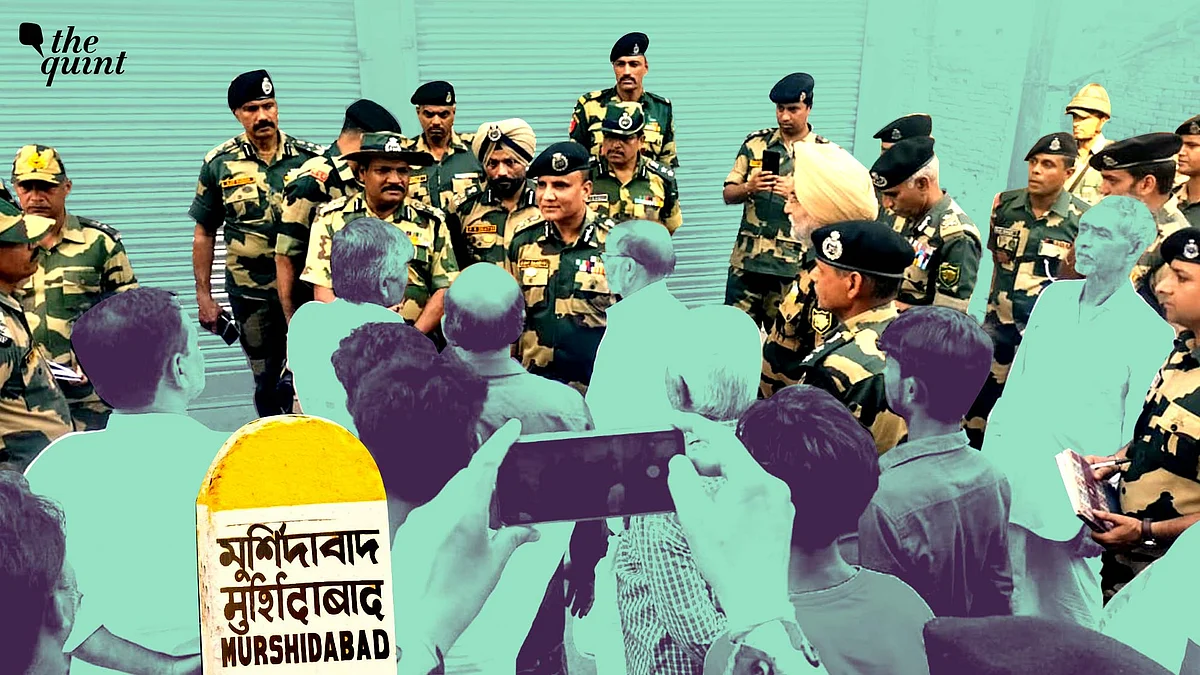
Murshidabad Riots: Blaming BSF Makes No One Look Good
It's preposterous to allege that BSF would ever deliberately allow illegal infiltration, writes Sanjiv Krishan Sood.

advertisement
The violence that erupted in Murshidabad district of West Bengal in the aftermath of the Waqf (Amendment) Bill, 2025 recently passed by the Parliament has led to avoidable loss of life and property of common people.
The clashes that occurred over the weekend of 11-13 April are reprehensible—and the culprits must be identified and punished. The fact that the West Bengal government and police failed to anticipate and control the situation is an adverse commentary on the law and order machinery of the state.
Centre vs State
West Bengal has a high percentage of Muslims in several districts, including Murshidabad. The passing of the Bill has invoked fear and anxiety among many in the minority community, who feel it is aimed at grabbing lands belonging to Waqf, as well as interfering with their religion and religious practices.
In addition, statements to the press like the one claiming the communal clashes in Murshidabad had been pre-planned in Bangladesh—and that the rioters exploited the porous border to infiltrate and create trouble in Bengal—further muddy the situation.
As per media reports, the Ministry of External Affairs (MEA) was given a report by the central forces, informing that the violence had roots in Bangladesh, where reports of violence against minorities have emerged since the ouster of former Bangladesh prime minister Sheikh Hasina last year.
The first question that such statements raise is about the coordination between the state and the Centre on matters of security.
In case the intelligence was not shared, it is a sad reflection on the state of coordination between the two. Only a proper enquiry will bring out the truth.
The second question is about the potential politicisation of the central forces. These statements invited a swift retort from West Bengal Chief Minister Mamata Banerjee, causing serious collateral damage to the image of the Border Security Force (BSF). The CM alleged the central forces deliberately allowed trouble makers to infiltrate, indulge in rioting, and exfiltrate.
The CM also stated that the role of the BSF will be investigated, regardless of the fact that the state government has no jurisdiction over the BSF, and cannot hold enquiry about its conduct.
BSF a Professional Force, Not Political
It must be emphatically stated that the BSF is a professional force and performs its duties with dedication and sincerity, leaving aside a few odd black sheep here and there.
The force operates under the control of the Central government, and to this extent, a state government cannot be held responsible for illegal infiltrations.
But it is also not the first time that politicians have blamed border management efforts to gain electoral mileage. The issue of illegal migration is raised every time an election is due and the opposition retort, invariably, is that borders are the responsibility of the Central government.
Such politicisation of a force like the BSF by politicians for electoral gains while diverting attention from their own inefficiencies is not in good taste and has the potential to demoralise the force.
Leave BSF at the Borders
It is nobody’s case that the BSF can ensure zero crime or illegal infiltration. Mistakes and errors of judgement can occur while guarding a border as large and as diverse as the India-Bangladesh border. However, alleging deliberate connivance is indefensible.
Internal security of India is inextricably linked with border security, and hence, border guarding—rather an all-inclusive border management system, especially on the eastern fronts—must be accorded due priority.
Withdrawal of large number of troops from the borders for prolonged periods—as had happened during the Lok Sabha elections held last year—leaves the border very thinly held and thereby prone to infiltration and crimes. Besides reducing the troop density at the border, the troops who are already overstretched are forced to work even longer hours, thus affecting their alertness and further increasing the vulnerability of border.
It cannot be debated that the Central government has constraints of resources for tackling internal problems. Hence, withdrawal of forces for unavoidable contingencies becomes imperative. However, such task-sharing must be minimised and the state police, the armed police, and India's reserve battalions located in states must be strengthened and empowered to deal with most contingencies.
It would not be out of place to mention that an allocation of Rs 5,597 crore in Budget 2025-26—though marking a 49 percent increase from an allocation of Rs 3,756 crore in the previous year—is totally insufficient for vast borders of India that encompass 15,106.7 km of land borders with seven countries and 7,516.6 km of coastal borders.
A back-of-the-envelope calculation will indicate that this translates to only about Rs 35 lakh per km for land borders—and less than Rs 25 lakh per km if coastal borders are included. The allocation must be enhanced for better border management.
Even though states have no say in operational aspects of the functioning of the border guarding forces, better coordination with state authorities, especially at local levels, would go a long way in enhancing operational environment and resolving minor issues.
Meanwhile, politicians must avoid the tendency to shift responsibility for their failures and doubt the capabilities of professional organisations like the BSF.
(Sanjiv Krishan Sood (Retd) has served as the Additional Director General of the BSF and was also with the SPG. He tweets @sood_2. This is an opinion piece and the views expressed above are the author’s own. The Quint neither endorses nor is responsible for the same.)
- Access to all paywalled content on site
- Ad-free experience across The Quint
- Early previews of our Special Projects
Published: undefined